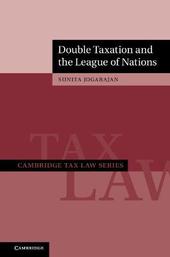
|
Double Taxation and the League of Nations
Hardback
Main Details
| Title |
Double Taxation and the League of Nations
|
| Authors and Contributors |
By (author) Sunita Jogarajan
|
| Series | Cambridge Tax Law Series |
|---|
| Physical Properties |
| Format:Hardback | | Pages:352 | | Dimensions(mm): Height 235,Width 157 |
|
| Category/Genre | Taxation |
|---|
| ISBN/Barcode |
9781108421447
|
| Classifications | Dewey:343.0526 |
|---|
| Audience | | Professional & Vocational | |
|---|
| Illustrations |
Worked examples or Exercises; 5 Tables, black and white
|
|
Publishing Details |
| Publisher |
Cambridge University Press
|
| Imprint |
Cambridge University Press
|
| Publication Date |
10 May 2018 |
| Publication Country |
United Kingdom
|
Description
Modern-day tax treaties have their foundations in one of the three Model Tax Treaties developed by the League of Nations in 1928. Using previously unexplored archival material, Sunita Jogarajan provides the first in-depth examination of the development of the League's Models. This new research provides insights into questions such as the importance of double taxation versus tax evasion; the preference for source-taxation versus residence-taxation; the influence of theory and practice on the League's work; the development of bilateral rather than multilateral treaties; the influence of developing countries on the League's work; the role of Commentary in interpreting model tax treaties; and the influential factors and key individuals involved. A better understanding of the development of the original models will inform and help guide interpretation and reform of modern-day tax treaties. Additionally, this book will be of interest to scholars of international relations and the development of law at international organisations.
Author Biography
Sunita Jogarajan is Associate Professor in the Melbourne Law School, University of Melbourne. She has published in the Oxford Journal of Legal Studies, British Tax Review and World Tax Journal.
Reviews'This book gives a vivid picture of the negotiations that will be of interest to those having a wider interest in international taxation. It should be compulsory reading for those developing policy in this field. It is, unusually, a tax book that will never become out of date.' John Avery Jones, British Tax Review
|